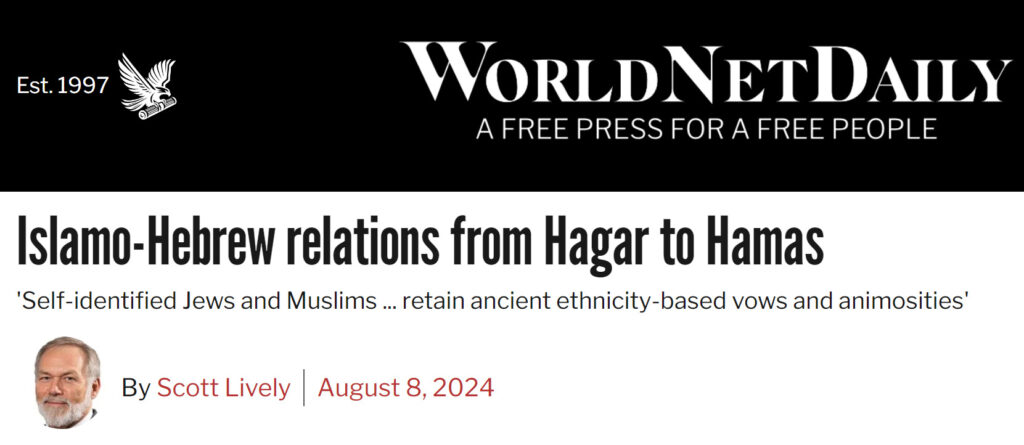When as a Christian law student in the mid-1990s I collaborated with the late Rabbi Samuel Dresner on a book project, he taught me to recognize many of the stories of the Old Testament (especially in Genesis) as cautionary tales: what humanity ought not to do and why. These mostly involved sexuality and family relationships; for example, polygamy (Genesis 4:19-24), homosexuality (Genesis 19:4-11) and incest (Genesis 19: 30-38).
The consequences to civilization of these sins were severe and lasting. The self-pride associated with Lamech’s polygamy led both to murder and the tradition of exacting revenge on others beyond proportion to what one suffered. (The Mosaic law of “eye for and eye” is actually an attempt to correct that error.) The social acceptance of homosexual depravity caused it to spread like a virus (Psalm 12:8) and became the key harbinger of God’s wrath from Genesis to Revelation. Lot’s incest with his daughters spawned the rival “Mamzer” nations of Amon and Moab – strictly banned from interbreeding with Israelites (Deuteronomy 23:3) as border nations continually hostile to the Israelites through Bible history.
One example we didn’t discuss is modernly called “swinging,” which is letting a stranger or strangers into the marriage bed by permission of the spouse. The first case of that in the Bible was initiated by (pre-covenant) Abram’s wife, Sarai, who thought the shame of her barrenness could be overcome by having her husband mate with her handmaid, Hagar. The near-term consequence of that was Hagar’s sudden and growing contempt for Sarai upon awareness of her pregnancy, which produced her son Ishmael – technically Abram’s firstborn. The long-term consequence was a root of lasting racial bitterness which vengeful Sarai caused when she “treated [pregnant] Hagar so harshly that she fled from her” into the wilderness per Genesis 16:6. (Abram himself had abdicated his responsibilities to both women and the baby by giving his wife free reign to do it.)
But God intervened there, when “the angel of the LORD told [Hagar], ‘Return to your mistress and submit to her authority.’ Then the angel added, ‘I will greatly multiply your offspring so that they will be too numerous to count.’ The angel of the LORD proceeded: ‘Behold, you have conceived and will bear a son. And you shall name him Ishmael, for the LORD has heard your cry of affliction. He will be a wild donkey of a man, and his hand will be against everyone, and everyone’s hand against him; he will live in hostility toward all his brothers.’ So Hagar gave this name to the LORD who had spoken to her: ‘You are the God who sees me,’ for she said, ‘Here I have seen the One who sees me!'”
The trouble that Abraham and Sarah invited into their pre-covenant home became a permanent part of it, but also was revealed to be a part of God’s plan for their eventual redemption after millennia of social and political complexities and drama.
Ishmael is racially and theologically the tap-root of Islam – the original “victim” of an ancient “oppression,” grounded in the ostensibly plausible claim of a stolen birthright. The world religion that eventually emerged from this grievance is thus centered on hatred of “Jews,” and in practice fulfills the Angel’s prophecy of a nation of innumerable “wild donkeys” in perpetual conflict with and hostility toward everyone outside of itself. History shows that description is perfectly represented in Islam – a religion of war and conquest for whom “peace” means total submission to itself. But which, to be fair, largely respects the God of the Bible to the extent they understand Him. Granted, their perspective is very confused and convoluted and mixed with ancient paganism involving a moon god – Judges 8:21 – but in some other ways cleaves more closely to biblical morality and social policy than do leftist and “moderate” versions of Christianity and Judaism.
The sin of polygamy was repeated by Jacob, causing the inheritance of Abraham’s covenanted promises to be divided between the separate houses of Leah and Rachel – a topic I write on frequently because of its forgotten centrality to Bible history and prophecy. That spawned the sibling rivalry of Judah and Joseph, which was spotlighted at their first crossroads with protean Islam in Genesis 37: Judah orchestrating the sale of Joseph to the Egypt-bound Ishmaelites – who were already slave-traders then, a custom and practice that persists today.
That was only the fourth generation of the civilization-restart God established through Abraham’s bloodline to reshape the post-flood world (which Sodom proved wasn’t going so well) and just the 14th generation from the flood itself. Racial genetics was a big factor then for God’s own reasons that don’t apply in the Christian era. People reaped blessings and curses based upon their ethnic relationships – individually and collectively. It was the sad reality of the world that innocent children paid the price for the conduct of their forebears (historically being slaughtered or enslaved by conquering armies) – until Christ came with a new standard of individual merit-based reward (prophesied in Jeremiah 31:29-30), which has since become one of the implicit first principles of “universal” human rights.
Although their diversified cultures have assimilated many Christian views and values over the past 2,000 years in whole or in part, self-identified Jews and Muslims by definition reject Christ as Savior and thus retain ancient ethnicity-based vows and animosities, which, biblically speaking, are still fully binding upon them – and are on full display today in the Middle East.
God told Abraham that “through your seed shall all the families of the earth be blessed” – and that fulfilled promise is manifestly true in that salvation in Christ is held today by individuals across the entire genetic spectrum of humanity. But the tribes/nations/races and sub-races themselves also still exist and still hold their own group identities – including very emphatically the Judeans (Jews), and the numerous now-Muslim nations of Bible history that still hate them, represented in genetic amalgam as Hamas “Palestinians.”
One other key group deserves mention here also, and that is the Edomites – descendants of Esau who was the victim of another sin involving family relations when his mother, Rebecca, dishonestly orchestrated the passing of Isaac’s estate to her favored son Jacob through trickery (Genesis 27). The enmity that arose then between fraternal twins Esau and Jacob and their descendants persists to this day – having arguably peaked in the lifetime of Herod the Great who slaughtered (with Roman backing) the entire Hebrew Hasmonean Dynasty to take the Judean throne for himself. (The Herods were among many Edomomite families forcibly converted to Judaism about a century before.) [I believe it was primarily the prevalence of Herodians (politically aligned with the Sadducees) among the Jews and Israelites in Jesus’ time that explains His use of parables to hide the true meaning of His messages from non-Hebrews (Luke 8:10).]
Most in Christendom who battle over “Zionism” wrongly think the fight is about the “goodness” or “evil” of the modern House of Judah relative to its possession of the Holy Land. The real fight is between Modern “Israel” and the ancient nations with alternate claims to the land whose dispute can only be resolved on the Field of Armageddon. And the reality is that the Jews are and have always been such a stiff-necked and rebellious people that only their loss of that war in the coming “time of Jacob’s trouble” – far beyond anything they’ve yet suffered on this earth – will be sufficient to finally break them to the will of the Messiah God at the heart of their religion and all their prophecies.
In the very end, they win it all – through collective surrender to Christ – after losing every earthly possession they ever gained and held through duplicity (Zechariah 14). And with that surrender comes the final reconciliation of the two houses that was first broken in Judah’s sale of Joseph to the Ishmaelites. That’s the message of Romans 11, backed by Jeremiah 31:12-13 – and by Hosea 1-3, Ezekeiel 37 and Matthew 24:3-26:1 – if you read them with two-house awareness.




